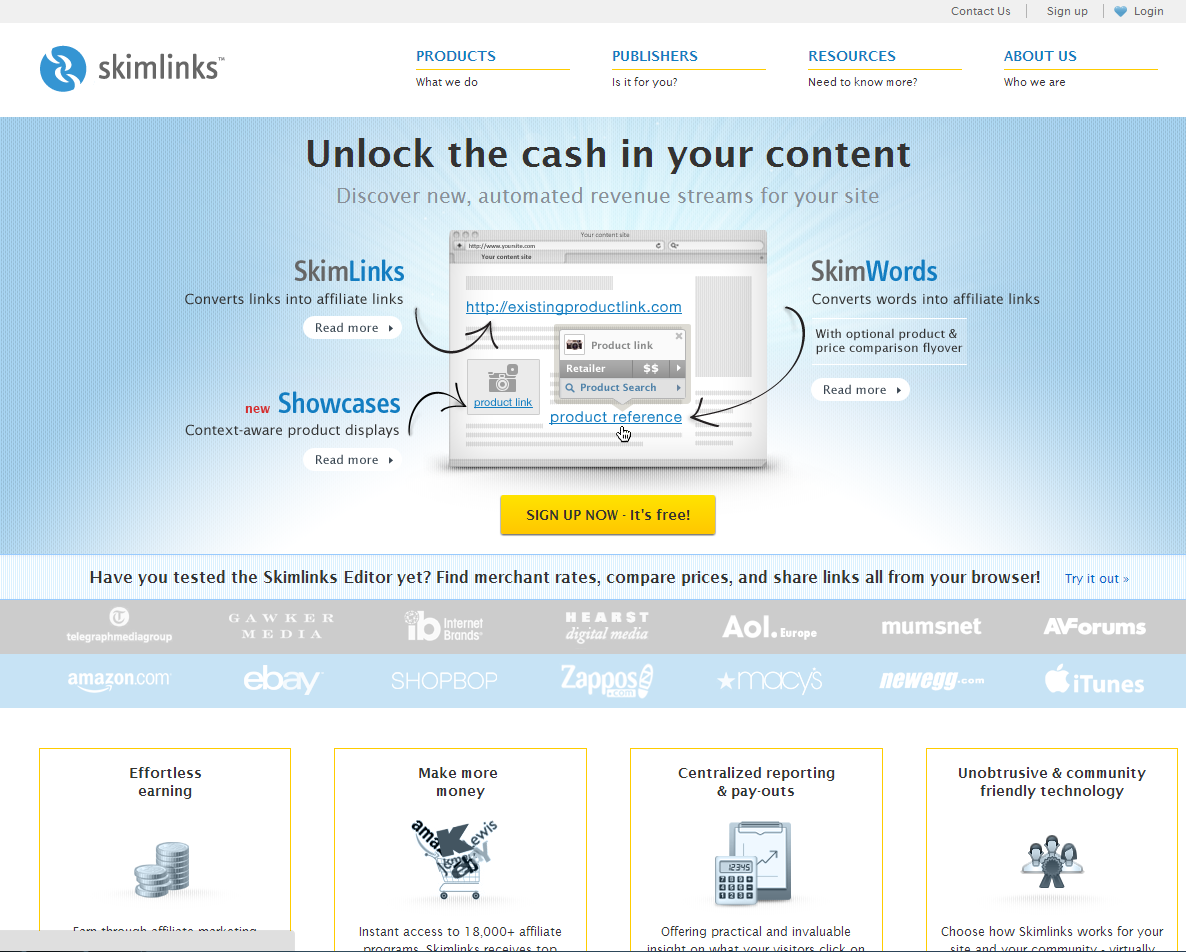Alicia Navarro is the founder of Skimlinks, a technology that helps online publishers make money through affiliate links.
Join us as she explains how she pivoted from her old company Skimbit to now Skimlinks, which drove $500M+ In E-Commerce Sales in 2013.
Please tell us a little bit about your company – what is Skimlinks all about?
Launched in 2008, Skimlinks creates native monetization solutions for publishers, rewarding them for e-commerce sales that their site drives by turning product links and product references into trackable affiliate links. We do this through a variety of great tools, including our award-winning SkimLinks and SkimWords products. Integrated with 18,000 merchants, including more than forty of the world’s leading affiliate networks, Skimlinks allows publishers to send traffic to all of the world’s biggest retailers and receive a premium commission for it. We believe monetization should be seamless so that publishers can focus on providing great content and a brilliant user experience.
Please tell us a little bit about your background and how you started your company?
I have always been in technology: I taught myself to code when I was 10 years old, and then studied computing sciences at university. My career has been in product management of technology solutions for both large companies and startups, in Australia and the UK. 7 years ago I decided I wanted to launch my own startup so I created Skimbit, a company offering social decision-making tools, in London in 2007. A year later, during the financial crisis, I pivoted Skimbit into Skimlinks, based on feedback from users and investors who showed interest in the automated affiliate marketing technology we’d developed to monetize Skimbit.
What are some of the projects you are working on right now?
One of the main projects we’re working on right now is the development of a new release of Skimlinks Editor. We released the first one last November and we’ve been working on new features since. The first version was pretty revolutionary in that it’s the first tool to allow publishers to find merchant rates, compare prices, and share links straight from their browser, but our next version takes things much further. I can’t share too much right now but keep your eyes peeled!

What are your plans for the future, how do you plan to grow this company?
Our major goals include expanding our merchant and publisher networks and getting the word out that there’s a truly effortless way to seamlessly connect content and commerce. We’re going to continue evolving our technology so that it can empower content creators to find new and unique ways to offer readers an unparalleled reading experience while making money from their digital content. We hope to revolutionize the way in which readers consume and interact with digital content.
What were the top 3 mistakes you made starting your business and what did you learn from it?
1. Raise more than you think you need. You’ll spend more and projects will take longer than you think they will. We did however become very good at doing a great deal with very little, especially in the early days, so it was in the end a blessing and a strength of ours.
2. Take care of yourself. It is easy to be cost-conscious and burn both ends of the candle, but ultimately, you need to be healthy and happy, so make wise investments in this. I now do this, but for a long time I was travelling too much and eating unhealthily, and this will always have repercussions which impact the business.
3. Trust your gut with hiring. Cultural fit is more important than experience or skills. We made a few mistakes in the past, and we now are religiously strict on the cultural fit angle.

Please share some advice for new tech entrepreneurs, someone who’s just starting out
You have to develop a good gut instinct. Data is imperative too, but you can get data to support a number of directions. Ultimately, you need to know your customers, your market, your competition, your landscape better than anyone else, and then you have to build your ability to make bold brave decisions based on that knowledge and your instincts. That is how a company stands out from the crowd.
What was the best business advice you have ever received and who gave you this advice
“It’s not the valuation that matters; its the terms and the investors. Focus on those, and not the valuation.” It was another entrepreneur, significantly more seasoned than me, who helped me understand what was important in a fund raise. Too many startups focus only on valuation and get into bed with the wrong VC on restrictive terms.
What are the top 3 online tools and resources you’re currently using to grow your company?
- (1.) 15five – great tool for managing people particularly in larger startups
- (2.) Sanebox – my lifesaver in terms of email management. Keeps me slightly above water rather than drowning totally in my inbox.
- (3.) LinkedIn – great for recruiting
What’s your definition of success?
Not having failed *yet*. What I mean by that is that I define success as a journey that—as long as I am still on it—means that I’m achieving success.
What are three books you recommend entrepreneurs to read?
- (1.) How to Win Friends and Influence People, by Dale Carnegie. I read it as a child and since then a dozen times, and its the most important simple guide to being a good leader and a good person.
- (2.) Influence: the Psychology of Persuasion. The best guide to marketing ever.
- (3.) Steve Jobs biography. Although I don’t think it is realistic or even desirable for entrepreneurs to be like Steve Jobs, the book gave me insights into what I was doing that was right, what I should learn to do, and what I should never do.
What is your favorite entrepreneurship quote?
Our company anthem is Fleetwood Mac’s “Go your own way”
Which I take very personally as my entrepreneurial mantra. If I’m going to make it, I want to do it our way, not being a cookie cutter approach to entrepreneurship.
How can our community get in touch with you?
The best way to get in touch with me is via Twitter: @AliciaNavarro








